JULY 19th, 2023 – Driving from Kyiv to the Southern parts of Ukraine, I can see that farmland is everywhere and that Ukraine is the world’s breadbasket. Wheat is ripening. Fruit is in season. Farms, as far as their eyes can see, make the flooding brought on by the Russian destruction of the Kakhovka Dam so unspeakably harmful.
Yesterday Mark & Hymie arranged for us to embed with the Red Cross offices of Kharkiv and Mykolaiv to help them assess and help the victims of the flooding of their neighbors in Kherson Oblast (Oblast is like a state in the U.S.) caused by the June 6th eco-terrorism event from the Russians destroying the Kakhovka dam.
After a briefing, some coffee, and some getting lost, we finally made our way from Mykolaiv to a small community where a local school now serves as a relief site where distressed locals can pick up food, clothing, water, etc. The children’s playground was full of lovely little kids playing under the watchful eyes of their mums. (Yes, I’m talking a bit British these days, thanks to a few days in the van with Hymie, who hails from London).
Just across the street was a destroyed building with a man selling fruit next door. I have mostly stopped taking photos or videos of demolished buildings as it is becoming redundant and a common site. But it was not lost on me that it was directly across the street from a school. I posted something on Instagram (you can follow at Instagram.com/RawTravelTV ) about taking a risk jogging by a Russian military target, a playground recently because so many Ukrainian children have been killed or maimed on them by the Russians, who seem not to value anyone’s life or humanity. I digress.
The Soviet-style playground for the school was like a look back into the 1970s or 80s at the height of the cold war, today all painted blue and yellow, Ukrainian colors, which would not have been allowed back then. Of course, I toured the outdoor toilet. Too bad “Don’t Skip the Loo” is already in “the can,” as it would have been good footage. At the school, we loaded a big water bladder capable of holding 10K liters of water to act as a water tank for two villages. This would be a test run; if successful, more would roll out.
In all, we visited two villages with the Red Cross. The smells in the villages where the water had now receded were intense, where the flood water had receded. The first village was unique in that when the Russians once occupied it, the village head did not flip to the Russians to save his skin but stayed loyal to Ukraine.
The seemingly tight-knit community gathered around to collect water and gossip. The town is luckier than most because electricity has been restored, though some are afraid to turn it on because many of the homes are still wet.
Hymie donated one of her brand-new laptops, courtesy of the Royal Bank of Montreal, to the “mayor” and the administrative center.
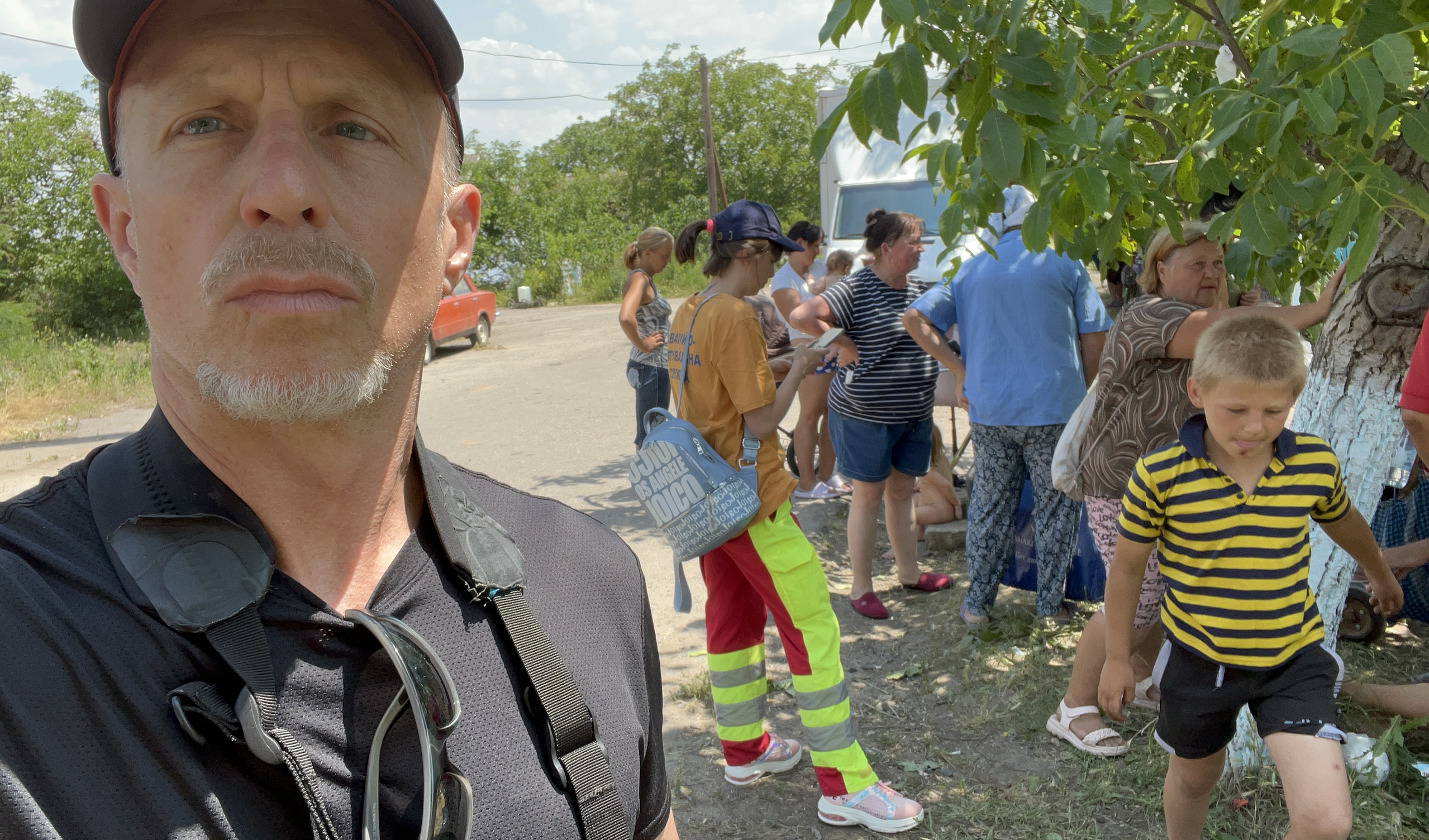
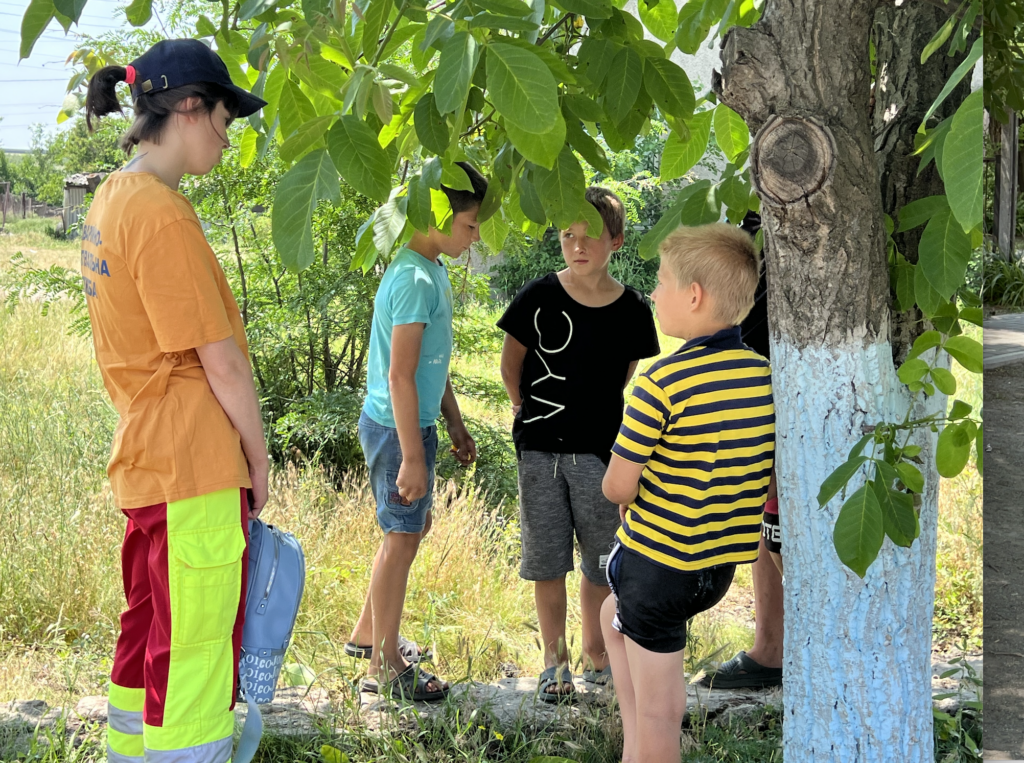
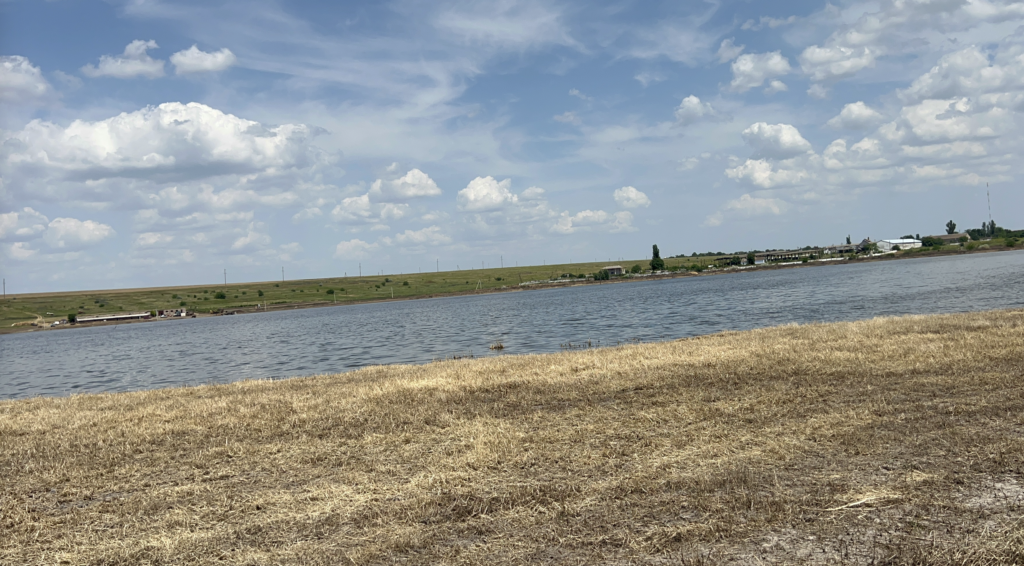
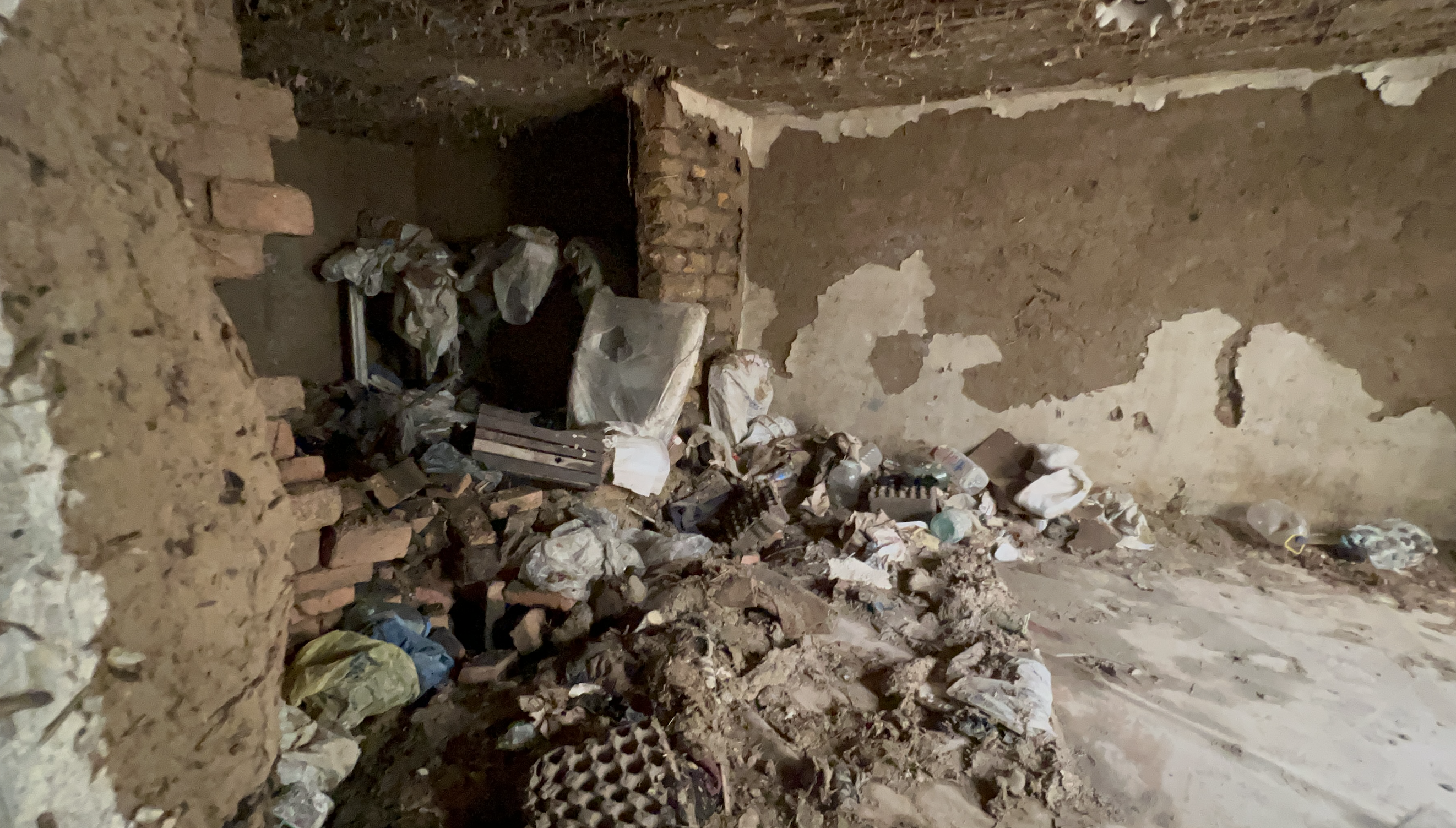
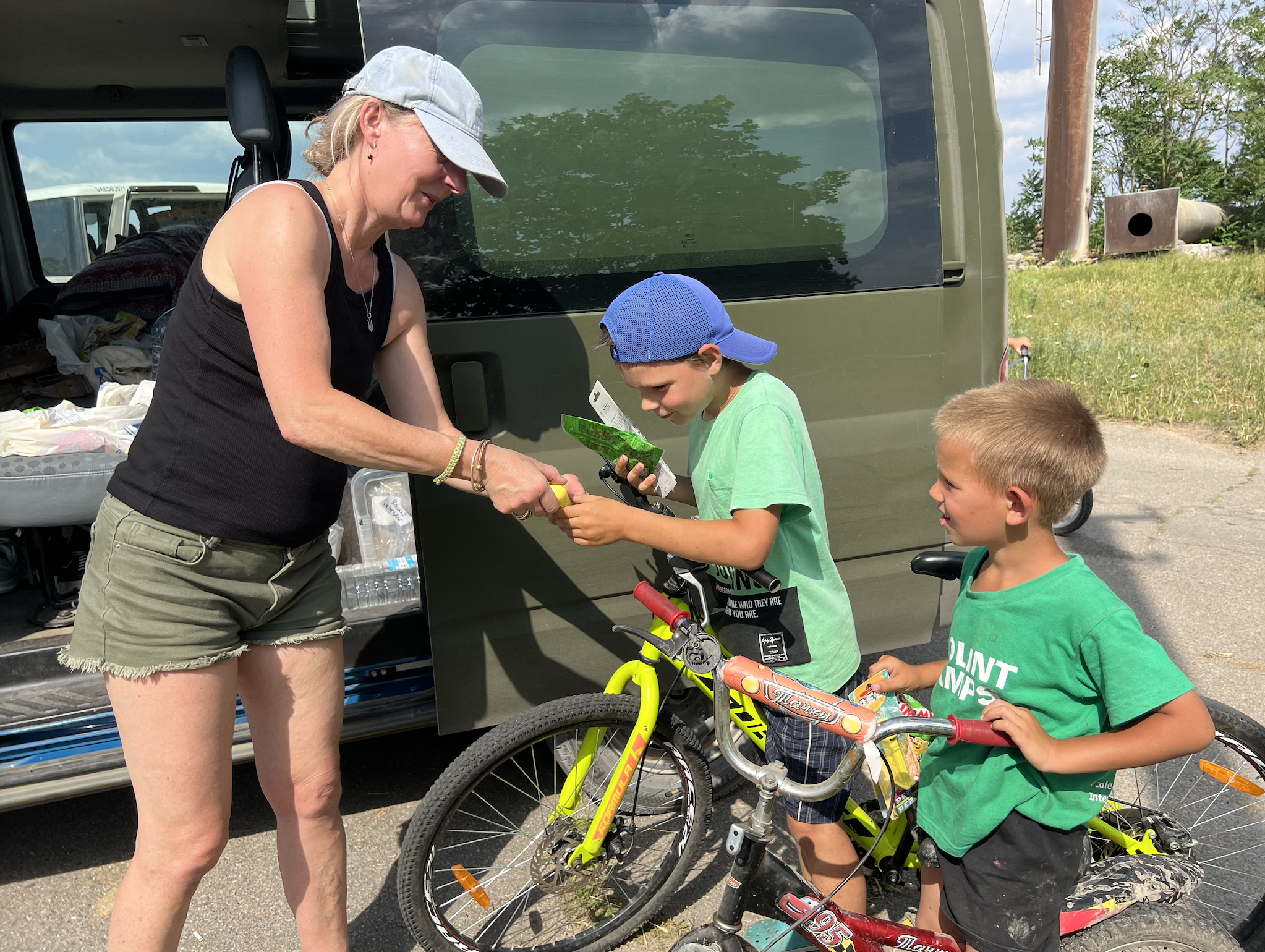
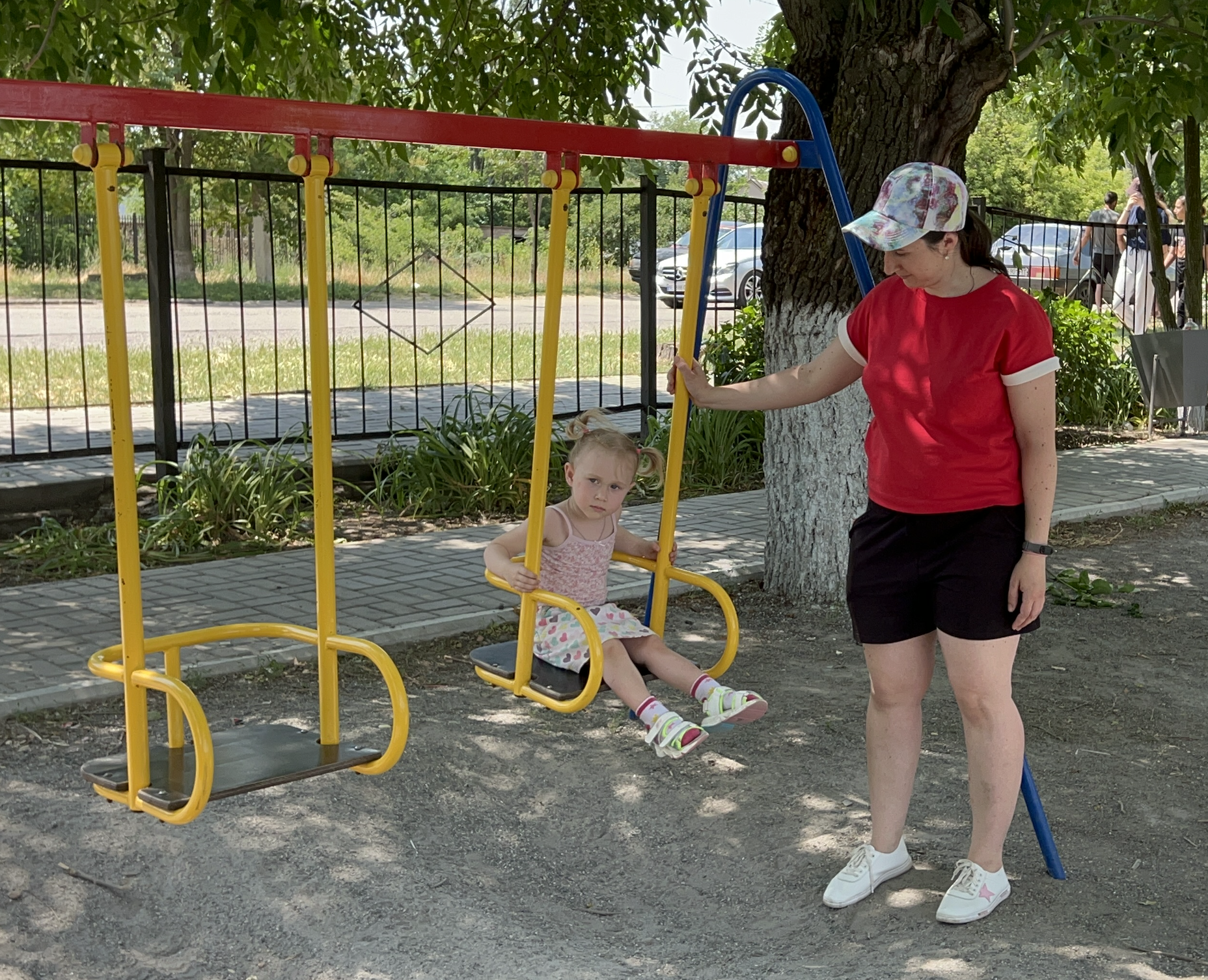
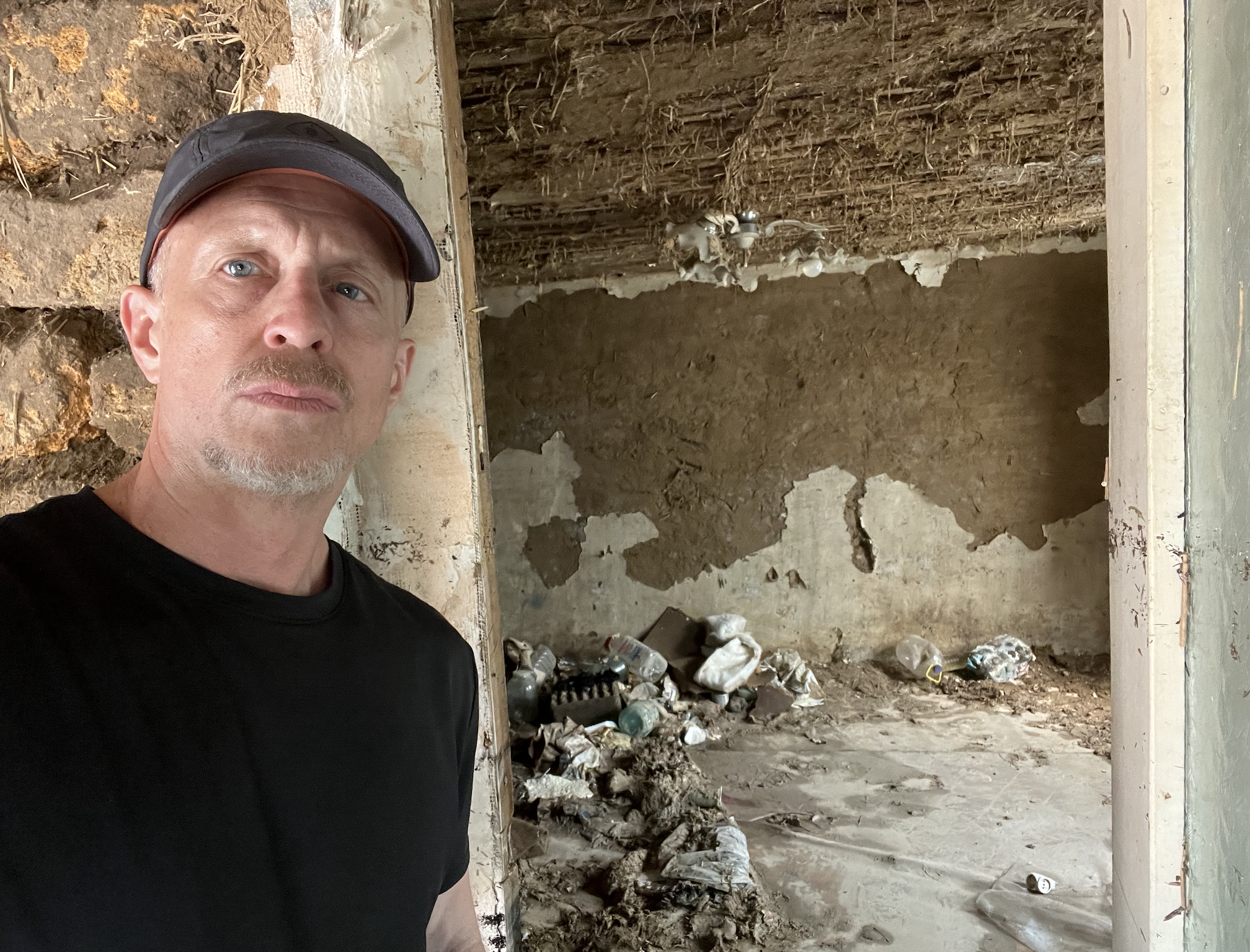
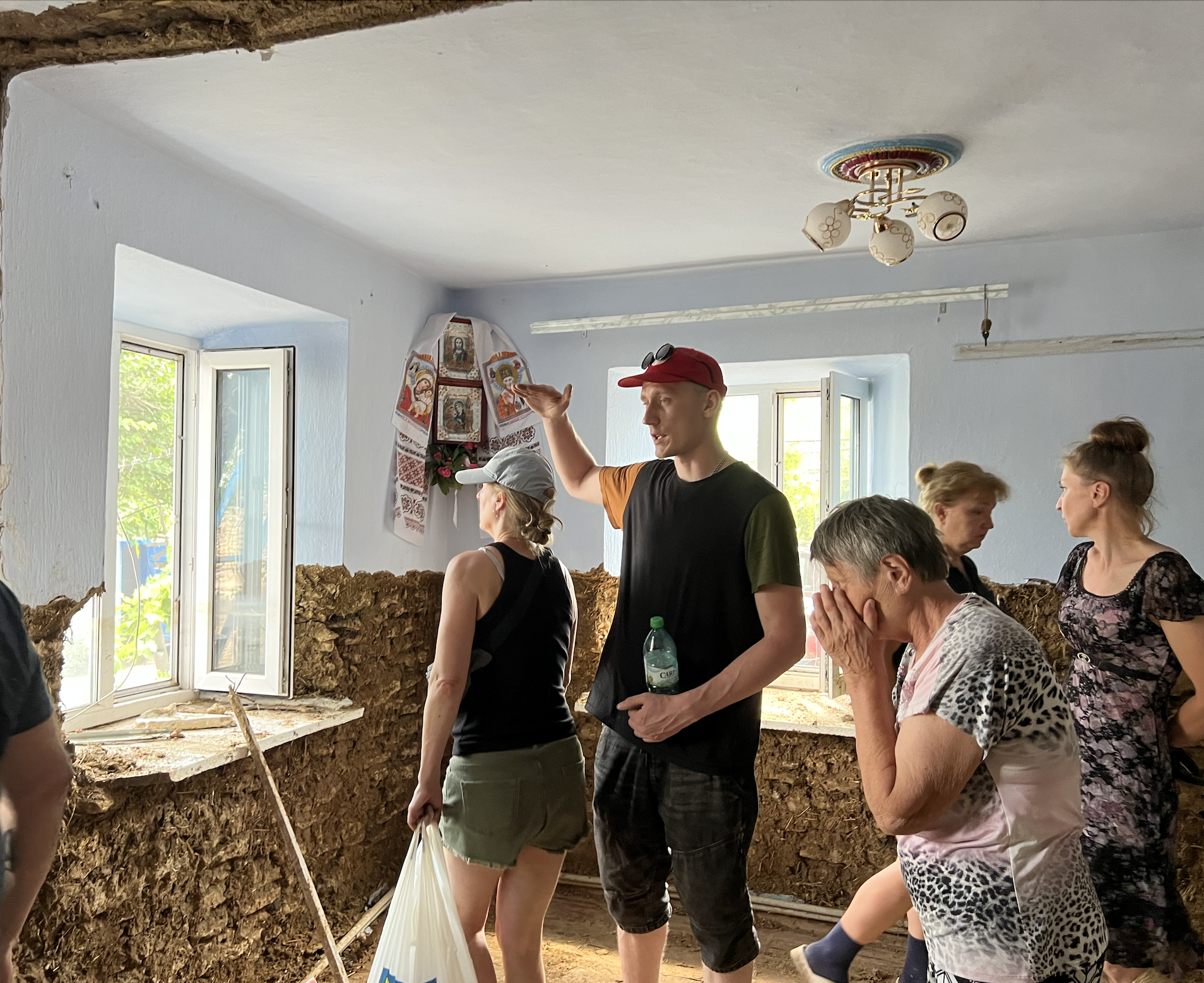
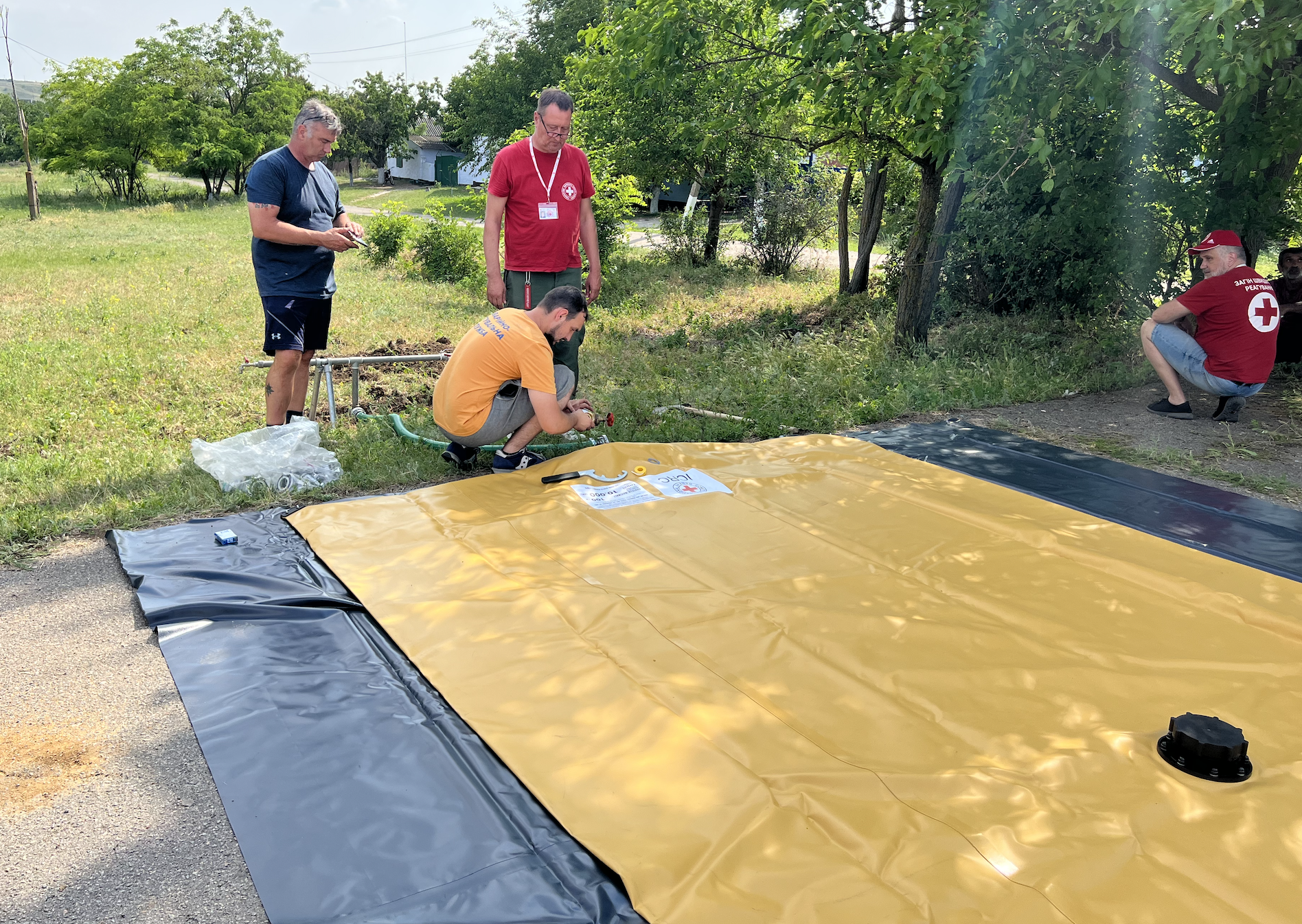
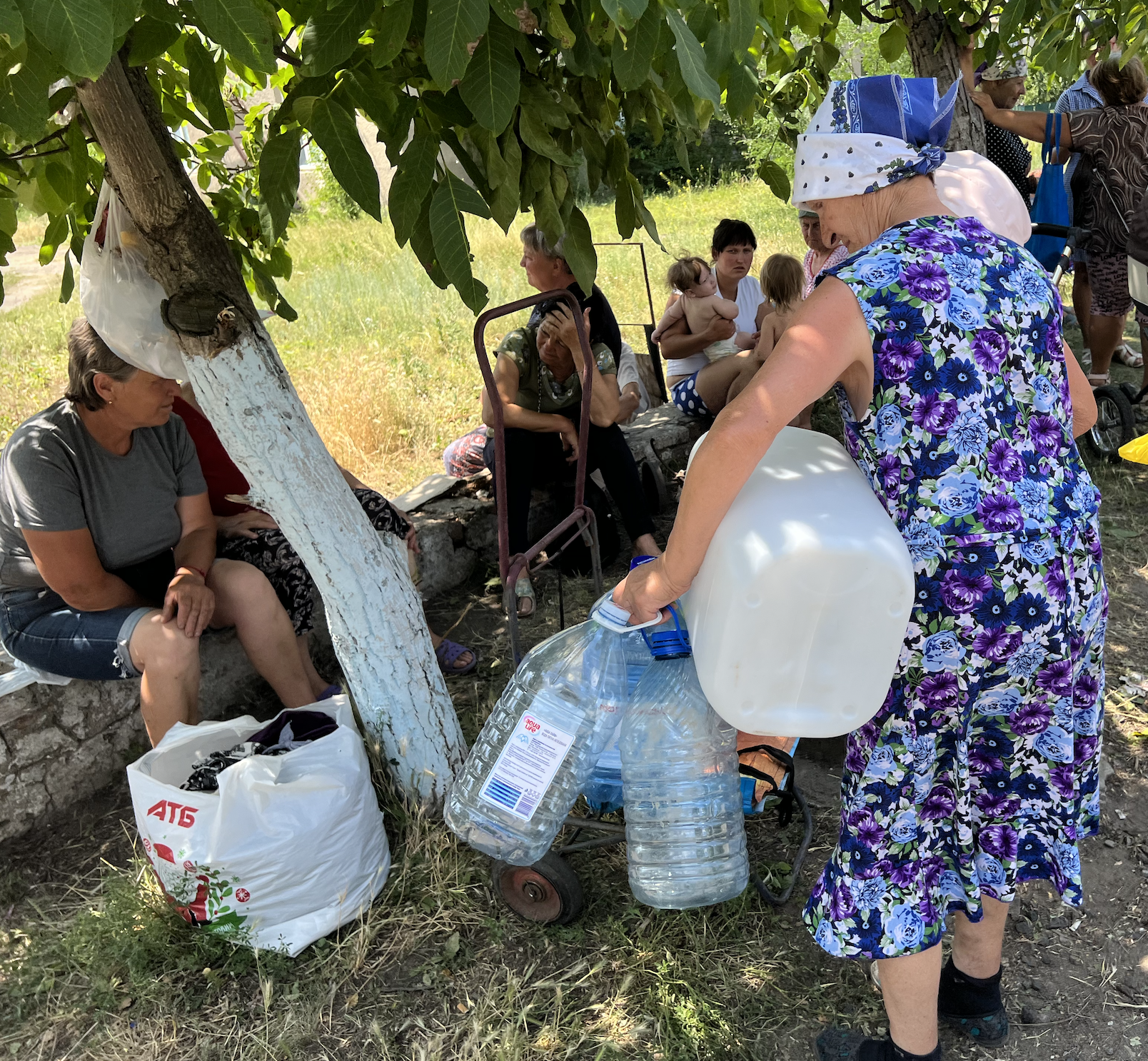
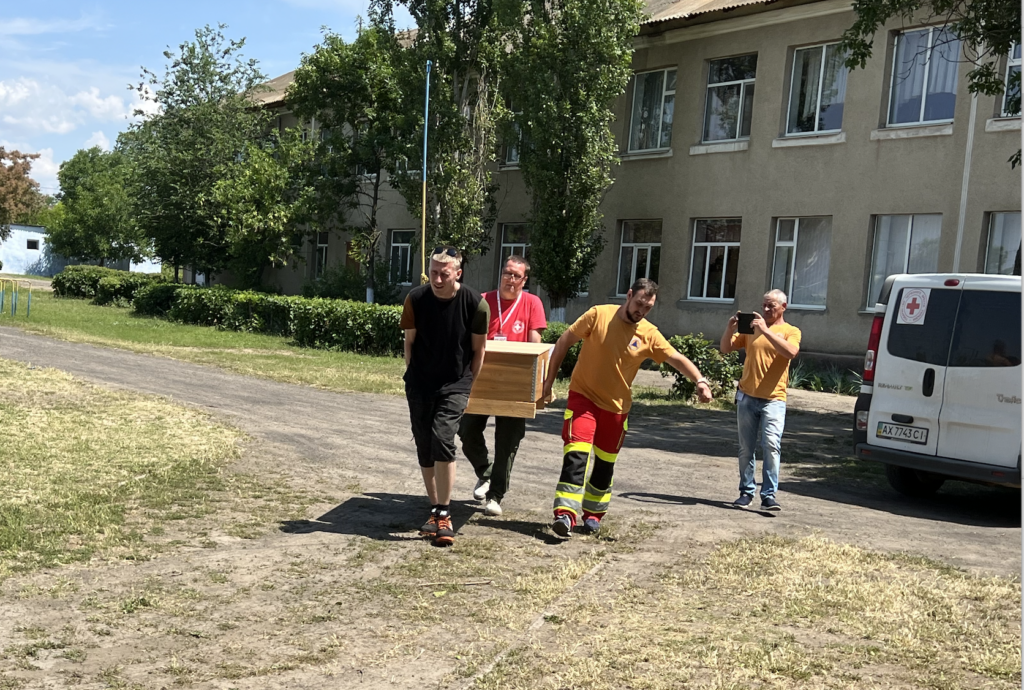
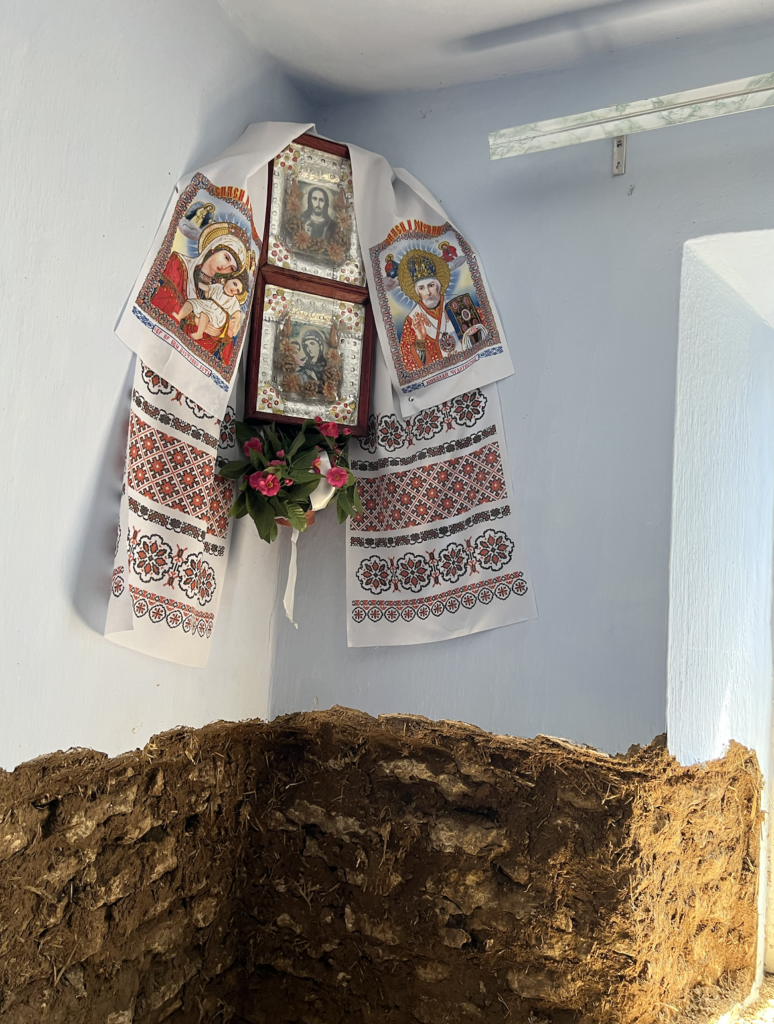
The next village was far away over some bumpy roads and not a very pleasant ride in the backseat of a cargo van. As we rolled up, it was apparent it had been completely devastated by the flood and the adjoining farmland, on which I assume the village once depended.
We dropped off the water bladder and toured a couple of the homes. The first home I toured had a giant collapsed sinkhole right next to the house.
Valentina is the sweetest grandmother, and she immediately grabbed me and started talking to me as she pulled me into her home, speaking in Ukrainian the entire time. I got the feeling she wanted me to witness her pain and what the Russians had done to her home as she encouraged me to film.
When Hymie walked in, she continued but broke into tears, with Hymie comforting her and me fighting back my own (something I’m getting used to as well) as I continued to film.
Artem, one our Kharkiv Red Cross bi-lingual contacts, translated for us. Valentina had been in this house for 54 years and raised a family with her husband. Some of her children had become medical professionals, but most were teachers. It was all gone within just 12 hours as the water rose and destroyed their home along with their garden upon which they depended.
You could see carefully saved items out in the front yard and on the upper reaches of the house, out of reach from the flood waters, containing beautiful religious imagery and lovely chandeliers. This was once a lovely home put together and was tended with tender loving care by its owners, who likely weren’t even remotely wealthy as they were subsistence farmers. Still, it was obvious that they took excellent care of what they had been blessed with.
A family photo album was drying in the sun out front, which was particularly upsetting. Luckily the photos seemed in good shape.
Valentina’s adult daughter, Natalia, came in and spoke a little English. I toured the home with both of them and picked up some words here and there. Somewhere in the conversation, I tried to ask if they spoke Ukrainian or Russian so I could figure out if it was better to say “Dyakuyu” (“thank you” in Ukrainian) or “Spasiba” (“thank you” in Russian) since we were in Southern Ukraine where Russian was also spoken. (Russian was the only language taught in schools during Soviet times as the Soviet government tried mightily to stamp out the Ukrainian language and all signs of Ukrainian culture and identity).
I couldn’t verbalize it properly, so I did what I always do when I run into an awkward silence with folks and let out a “Slava Ukraini” (Glory to Ukraine), to which they both brightened, smiled, and even laughed as they let out the response “Heroyam Slava” which means “Glory to the heroes.” When we left Valentina’s uninhabitable home to tour other homes, Valentina was far from defeated. She was a bit defiant. Talking about how the Russians would never win and that they would rebuild as soon as she got the materials in hand.
I tried to give them a little money, but they staunchly and vehemently refused. I can’t understand much of Ukrainian, but I understood that they just want the building materials and will rebuild themselves. While inspiring, I’m not sure how true that may be because the farmland all around the village, on which they rely for a living, has been ruined for decades. The smell alone was toxic, and I was unsure when the air would be safe.
With the village leaders (a woman this time), we toured around the rest of the village, where I saw a boat sitting in the middle of the street and a ruined honeybee colony. The next house was in much worse shape than Valentina’s and was well beyond repair, so they had yet to bother with any cleanup.
The air was so dank and horrific I used my shirt to cover my nose and mouth and watched carefully where I stepped. There was very little salvaged from the house, but a well-fed dog whined as I passed by. I felt the same way. The smell became overwhelming, and I realized I might be breathing in toxic chemicals, not to mention walking around in it, so we left off touring the flooded homes to do something to actually help these folks and install the water tank.
It reminded me a bit of the public works projects I often see, where it appears a couple of folks are doing all the work. Everyone else is standing around, but I have a new perspective now. Everyone had a role in driving, manual labor, or engineering. And everyone did their part when it was time. Village members made their way over to offer their help or just opinions. It was a relaxed atmosphere. I filmed everyone getting some big stones to serve as the roadblock to keep anyone from driving over the flaccid bladder of the water tank lying on the pavement, waiting to be filled with H2O. We had a little world-central kitchen food the Red Cross folks had brought in, which was welcomed (support those guys if you can). We were on high ground, away from the flooded area and toxic air.
All was peaceful and tranquil when we heard what sounded like thunder. I know by now that it was not thunder. Mark, our group’s retired marine and military expert, commented that it must have been a big blast to carry all that way.
A few minutes later, I wandered off to a field to record a video diary and noticed plumes of smoke on the horizon. They grew bigger and whiter as the day wore on, and Mark was afraid the Russians may have bombed a Ukrainian ammunition dump. Turns out, it may have been the other way around, as I read later. I hope so.
Either way, the realization that most likely people (be it Ukrainian or Russian, it’s a tragedy in my eyes) died when I heard that first thunderous boom sobered me even more.
On this day, in this small village tour with the Red Cross, we were told we didn’t need our body armor, and I think that was a correct call. Though visible and within hearing distance, the bombing was far away and was likely a targeted missile. However, we read in reports that a 27-year-old man had been killed in his home in Kherson, the town we visited the day before. I’m not 100% sure of the odds, but it feels a bit like getting struck by lightning. Your odds of getting hit are stronger in a raging thunderstorm, and the thunderstorm rages constantly in Kherson and near the front. The further you are away from the front, the less likely you are to get struck.
I’m torn between showing war and devastation or the normalcy we feel most of the time in most of the country. Both are true, and both are realities. I don’t want to glibly pretend that life is pleasant in Ukraine or that it’s constant fear and danger here. I simply wish to show the reality as I experience it, not on the front lines, but as a DIY travel journalist embedded with volunteers.
As we drove to Mykolai to spend the night before returning to Kyiv the next day, I reflected on the last three days and how I’d changed.
I was no longer nervous or afraid… now I was just profoundly sad yet somehow content… and an odd mix that adds a new perspective to the cliche of “mixed feelings.”
And I wondered how it would have been such a great road trip if only no war had been raging.
KHERSON OBLAST – Is a “state” in Southern Ukraine, partially controlled by Ukraine and partially Russian Occupied. The city of “Kherson” is fully controlled by Ukraine after several months of Russian occupation in 2022 and is about five miles from the “front.”
